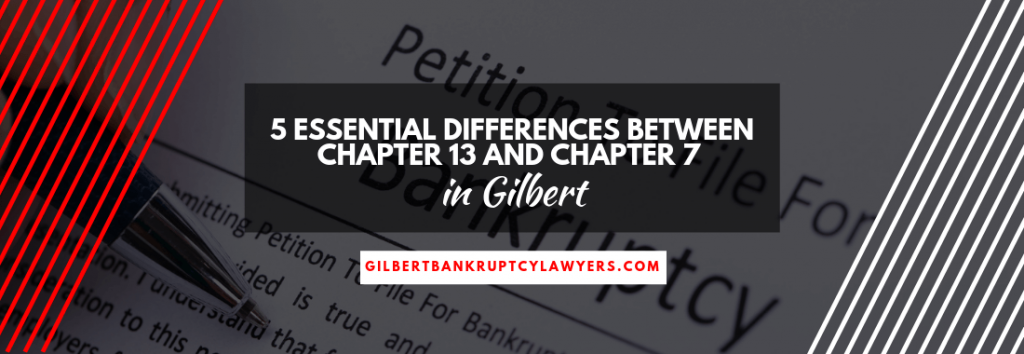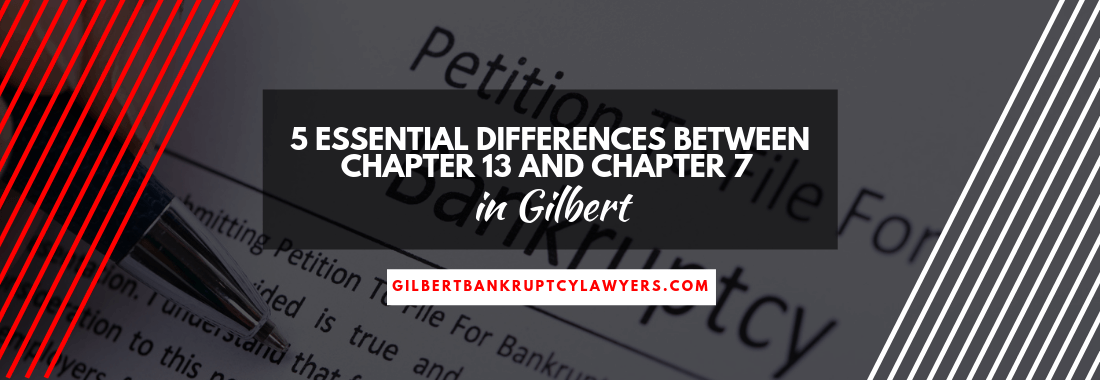5 Essential Differences Between Chapter 13 and Chapter 7 in Gilbert
You may finally be thinking of filing for bankruptcy after struggling with overwhelming debt for months or even years. Now that you’ve looked around for information about the process, you may have been surprised to find that there is more than one type of bankruptcy. You don’t just file and get a discharge for all your debts. You need to determine the right type of bankruptcy – Chapter 7 or Chapter 13 – and which you qualify for.
Here are five essential differences between Chapter 13 and Chapter 7 in Gilbert to help you decide which is right for you:
Debts Discharged
Typically, people think that you file for bankruptcy and all your debts are wiped clear. That’s not actually true. The closest you can get to a total discharge of debt is with a Chapter 7 bankruptcy, which clears your unsecured debts like credit cards and medical bills. Chapter 7 bankruptcy does not discharge your student loans, recent tax debts, and some other types of debts.
With a Chapter 13 bankruptcy, you get a debt restructuring plan, rather than a discharge of your debts. The bankruptcy trustee evaluates your financial resources and determines what you can pay toward your debt. You get a three- to five-year repayment plan that consolidates all of your debts into one payment. Any balance remaining at the end of that repayment period may be discharged. You get debt relief by getting a more manageable payment, freeing yourself of interest, and possibly discharging part of your debt.
Timing
By the time you file for bankruptcy, you probably feel overwhelmed and ready to be done with your debt problems forever. One of the primary advantages of a Chapter 7 bankruptcy filing is that it can offer you fast relief. The entire process can take only a few months from start to finish, and you can be done with a majority of your debt for good.
With a Chapter 13 bankruptcy, you will need to go through those few months while your bankruptcy filing is processing, and then you will have to wait three to five years for your repayment plan to be completed. You’ll get some relief under the consolidated payment, but you won’t have the total relief you want until the repayment period is over.
Retaining Ownership
Many people want to get rid of their debts with bankruptcy, but they want to keep the things they need, such as their home and their car. Under a Chapter 7 bankruptcy filing, any assets you own can be collected and sold to satisfy your debts. There is a certain exemption for assets like your home and car, and many people are able to keep these items if they have not built up a lot of equity.
If you don’t meet the exemption requirements to keep your assets, the better option for you will be to file Chapter 13 bankruptcy, which allows you to retain ownership of all your properties. You can even use the filing to catch up on missed payments if you are in danger of foreclosure or repossession.
Foreclosure
You may start thinking about bankruptcy when things get really bad for you and you are facing the risk of foreclosure on your house or repossession of your vehicle. Unfortunately, filing for Chapter 7 bankruptcy will not protect you from foreclosure or repossession. These are secured debts, and if you are unable to pay what you owe, the lenders have the right to take back that property and sell it to satisfy what you owe.
Only filing for Chapter 13 bankruptcy can help you avoid foreclosure or repossession since it allows you to get on a repayment plan to catch up with what you owe. Filing for Chapter 7 bankruptcy may free up some financial resources to pay what you owe by freeing you from payments to unsecured debts.
Eligibility
Not everyone is eligible to file for Chapter 7 bankruptcy. To qualify, you must pass a “means test” that analyzes your income and your expenses. If you make to much money, you won’t qualify to file for Chapter 7 bankruptcy. If you don’t qualify to file for Chapter 7, you may qualify for Chapter 13 bankruptcy, which will primarily look at your ability to satisfy the repayment plan.
Meeting with an experienced Gilbert bankruptcy lawyer can help you understand more about the differences between Chapter 7 and Chapter 13 bankruptcy and which one might be right for you. Once you have identified the right type of bankruptcy, you can move forward and create a strong filing that will help you get the debt relief you need.
Gilbert Bankruptcy Lawyers may be able to help you. Our expert bankruptcy attorneys will review your finances and give you tailored advice about the right course of action in filing for bankruptcy. We’ll then put together a strong filing to help you get a fast judgement so that you can begin the process of rebuilding your finances. Call us today to talk with a Gilbert bankruptcy attorney about your options.
Published By:
Gilbert Bankruptcy Lawyers
Office: 480-448-9800
Website: https://gilbertbankruptcylawyers.com

